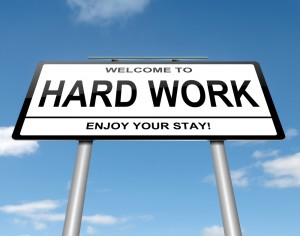There is no strategy without leadership courage. Strategy by definition demands asking and answering the hard, existential, foundation-shattering questions that create sleepless nights and stomach distress.
And then comes the decision-making part, where courage gets a road test.
Saying “yes” to new and different is almost as hard as saying “no” to the familiar.
Did I mention that real strategy requires leadership? And courage?
The Race for the Status Quo is Crowded:
I’m consistently disappointed when a leader and her team come face-to-face with the big issues, stare at them, and then back away to leave them for another day.
Disappointed, but not surprised, when courage takes a holiday.
The pursuit of the status quo is the biggest race in the world and almost everyone in a position of power is participating in it.
We’re busy protecting our pet projects and our fragile egos. However, this lack of leadershi p courage comes at a cost.
p courage comes at a cost.
Choosing the status quo is capitulating to entropy.
It means demise.
The pace of the demise varies across industries, but standing still ultimately ends in getting run over in this world of change.
Related: A to Z On Why Your Strategy Initiative Will Fail
Yet, Fair Warning: the Road Less Travelled is Treacherous:
Alternatively, it takes leadership courage, or perhaps a better descriptor: courageous leadership, to forego this race of more-of-the-same for one that is much less defined.
And while it may sound noble to choose the road less traveled, don’t fool yourself into thinking this is easy. This road has some probability of being every bit as disastrous as accepting the status quo.
You can make a bad bet; you can choose the wrong strategy for the situation, you can fail to anticipate the real risks, or, as is most common, you can muck up the execution.
However, Facing Reality Head On is the Only Chance of Survival:
But, you can get it right. That’s the goal.
You can diagnose your situation accurately.
You can decide what to do about the situation.
And then you can identify and execute on the actions necessary for success.
It’s hard work facing up to reality and then actually doing something about it.
Egos will be bruised or battered.
One of the most critical questions to ask and answer is: “Given our approach, what must we stop doing?” This may be the hardest question of all to answer.
Pet projects, long-standing initiatives, and yesterday’s business models will be sacrificed in the process.
The great news is that this is good work for us. It is about creativity and renewal. It’s about the pursuit of something meaningful.
Managed properly, the hard work of strategy is stimulating and galvanizing for organizations.
And there’s that thing about survival.
The Bottom-Line for Now:
Did I mention that the hard work of strategy requires leadership and courage?
—


